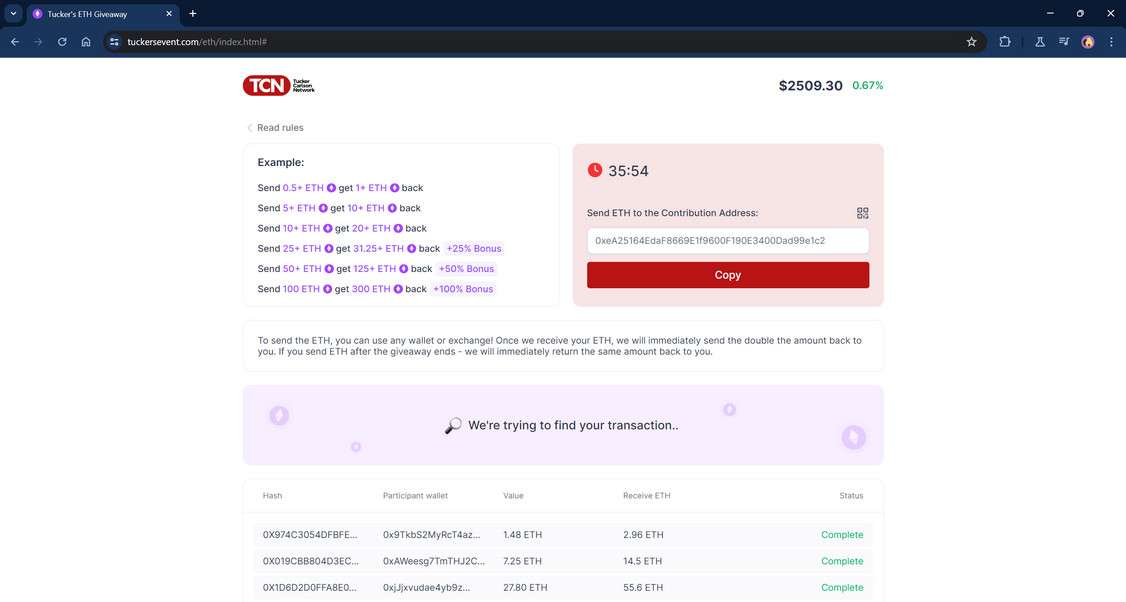A new cryptocurrency giveaway scam has recently emerged, falsely claiming that popular TV host Tucker Carlson is giving away 700 BTC and 2,000 ETH. This online scam is being promoted via deepfake videos on social media sites like Facebook, Instagram, TikTok, and YouTube.
The deepfake videos depict Tucker Carlson announcing a major Bitcoin and Ethereum giveaway for his supporters. The videos direct viewers to a website called TuckersEvent.com, which has a signup page mimicking a real crypto giveaway.
However, this is an outright scam. Tucker Carlson has no association with this fake crypto giveaway. The website, videos, and the entire supposed “event” are a scam designed to steal cryptocurrencies from victims.
This article will provide an in-depth overview of how this crypto scam works, so you can identify and avoid it. We’ll cover how the scammers operate, what happens when victims try to participate, how to spot the red flags, and what to do if you or someone you know has fallen prey to this giveaway scam.


Overview of The Tucker Carlson 700 BTC / 2,000 ETH Crypto Scam
This Tucker Carlson cryptocurrency giveaway scam is orchestrated via deepfake videos on social media and a fraudulent website TuckersEvent.com.
The site claims that to celebrate Tucker’s journey over the past year, he is giving away 700 BTC and 2,000 ETH to his supporters. Visitors are encouraged to send their own crypto to a specified address to “double” their coins and participate in the purported giveaway.
However, this is an outright scam. Tucker Carlson has no association with this fake crypto giveaway. The website, videos, and the entire supposed “event” are a scam designed to steal cryptocurrencies like Bitcoin, Ethereum, and more from unsuspecting victims.
The scammers are illegally misusing Tucker Carlson’s name, image, and likeness to promote this fraud. The deepfake videos are designed to falsely show Tucker endorsing and promoting the fake giveaway. This tricks viewers into believing it is real.
But Tucker Carlson has never endorsed any cryptocurrency giveaway. The scammers are fabricating the entire thing in order to steal crypto deposits from victims who fall for their ploy.
This type of celebrity cryptocurrency giveaway scam is becoming increasingly common. Variations of it have also abused the likeness of celebrities like Elon Musk, Kate Winslet, and others without their knowledge.
For example, in early 2023 scammers used AI deepfake technology to generate fake videos of Elon Musk promoting a Bitcoin giveaway scam. The videos appeared authentic and went viral on YouTube and Twitter.
Many victims were deceived into sending crypto donations, believing Elon Musk would send back more Bitcoin. In reality, it was cybercriminals simply pocketing all deposits.
These types of scams highlight how deepfake technology can be misused for fraud and deception. The AI-generated fake videos are now advanced enough to look quite convincing to everyday social media users.
Combining deepfakes with cryptocurrency giveaways allows scammers to create an enticing scam offer. People’s desire to gain quick and easy profits blinds them to the red flags.
This is why awareness about celebrity crypto giveaway scams is so important. Understanding the warning signs allows internet users to be cautious when they encounter such offers online.
With the Tucker Carlson scam, the website TuckersEvent.com is central to deceiving victims. It falsely presents itself as an official event website for a real Tucker Carlson 700 BTC and 2,000 ETH giveaway.
In reality, the TuckersEvent site is entirely fraudulent. It was set up solely to facilitate this scam. The site and the associated social media accounts have no actual affiliation with Tucker Carlson.
The scam website employs additional deception techniques to appear more legitimate. It displays fake metrics about funds raised, maximum bonus coins available per person, and more.
This lends an air of authenticity – but it’s just fabricated details. The site also utilizes urgency cues, limited time offers, and other social engineering tactics to convince victims to send crypto quickly without deeper scrutiny.
Once cryptocurrency is sent to the address listed on TuckersEvent.com, it goes directly into the scammer’s wallet. The victim receives nothing in return. There is no doubled crypto, no bonus giveaway coins, or anything else promised.
The scammers immediately take the deposits, shut everything down, and disappear with the stolen cryptocurrency. The deepfake videos, website, and social media presence all get deleted once the scam completes.
If you see any offers for a Tucker Carlson crypto giveaway online, exercise extreme caution. Assume it is fraudulent unless officially verified otherwise. Stick to trusted sources in the blockchain community for legitimate giveaways, and avoid random deepfakes or scam websites.
With cybercriminals regularly impersonating celebrities for crypto scams, adopting a skeptical mindset is key to protecting yourself. The supposed 700 BTC and 2,000 ETH Tucker Carlson giveaway is definitely a scam. But being informed about how it works provides the knowledge needed to identify and steer clear of this fraud.
How The Tucker Carlson Crypto Giveaway Scam Works
The scammers behind this fraud employ very clever psychology and social engineering tactics to convince victims to willingly send their own cryptocurrency.
Here is a step-by-step breakdown of how this scam operates:
1. Fake Celebrity Endorsement Via Deepfake Videos
The scammers create high quality AI-generated deepfake videos of Tucker Carlson announcing and endorsing the giveaway. The deepfakes are designed to look and sound like real videos from Tucker’s shows.
These deepfakes lend credibility and urgency, making victims believe Tucker is truly giving away hundreds of thousands in crypto. The videos are promoted via social media ads and posts across Facebook, Instagram, TikTok, YouTube, Twitter etc.
2. Directing Victims to the Fraudulent Site
The deepfake videos all direct viewers to visit TuckersEvent.com to participate in the fake crypto giveaway. The site is carefully designed to look like a legitimate event page tied to Tucker Carlson.
Using Tucker’s brand and imagery helps establish trust and authority. The site also displays fake metrics like $40 million raised, and 60 BTC/300 ETH maximum per person. This makes the giveaway look more real.
3. Asking Victims to Send Crypto to “Participate”
On the TuckersEvent site, victims are instructed to send their own crypto to specified BTC and ETH addresses in order to “double” their coins and receive the bonus giveaway funds.
For example, they claim that sending 0.5 ETH will get you 1 ETH back instantly. This tactic preys on greed, as people believe they can easily double their money by participating.
4. Stealing Deposits and Vanishing
Once victims deposit crypto into the address provided, the scammers immediately steal it. No crypto is doubled or sent back, and the promised giveaway funds never materialize either.
The scammers simply take the deposits, delete any evidence, and quickly disappear. Victims lose all the cryptocurrency they deposited, thinking they were participating in a celebrity giveaway.
Red Flags: How To Spot The Tucker Carlson Crypto Scam
While this giveaway scam is quite elaborate, there are several red flags that can help you identify and avoid this fraud:
- Too good to be true – No legitimate giveaway will ever ask you to send crypto first in order to receive bonus coins. This is a classic scam tactic and a huge red flag.
- Urgency cues – Language like “limited time only!” and “act fast before the giveaway ends!” pressure victims to suspend disbelief and send funds quickly without thinking.
- Fake endorsements – Tucker Carlson has not actually endorsed this. The deepfakes are designed to falsely show his endorsement.
- Site registered recently – TuckersEvent.com and other scam giveaway sites are often newly registered and short-lived. They vanish once the scam ends.
- No verification – There is no KYC or identity verification. Scammers want to avoid having their identities known.
- Spelling/grammar errors – The site copy often has errors, as most scam sites are hastily assembled without much QA.
- No guaranteed payouts – Aside from vague claims, there are no guarantees you will actually receive anything after sending crypto.
When analyzing potential crypto giveaways, approach with extreme caution if any of these red flags are present.
Frequently Asked Questions About The Fake Tucker Carlson Crypto Giveaway Scam
1. Is the Tucker Carlson 700 BTC / 2,000 ETH giveaway real?
No, this supposed crypto giveaway promoted online is completely fake. Tucker Carlson has not actually endorsed or announced any Bitcoin or Ethereum giveaway. The videos are AI-generated deepfakes, and the TuckersEvent website is a scam designed to steal cryptocurrency deposits from victims.
2. How are the scammers promoting this fake giveaway online?
The scammers are using deepfake videos hosted on YouTube, Facebook, TikTok, Twitter and other platforms to falsely show Tucker Carlson endorsing the giveaway. These videos direct people to the fraudulent TuckersEvent.com website to participate.
3. What happens when you try to participate in the giveaway?
The fake TuckersEvent website claims you must send your own crypto to an address to receive bonus giveaway coins. If you send funds, the scammers immediately steal it. You will not receive any crypto back. The promises of bonuses and doubled deposits are completely fake.
4. What techniques do the scammers use to convince people the giveaway is real?
The scammers use very convincing deepfake videos to mimic Tucker Carlson and lend credibility. The scam site displays fake stats and metrics to look more legitimate. Urgency cues pressure victims to act fast. Limited time offers build false hype.
5. How can you spot this crypto giveaway scam and avoid it?
Red flags include celebrity endorsements in crypto, requests to send your own crypto first, newly registered scam sites, spelling/grammar errors, no verification, too-good-to-be-true offers, and urgency tactics. Always verify crypto giveaways directly with the celebrity’s PR team before participating.
6. What should you do if you already sent crypto deposits to this scam giveaway?
If you sent cryptocurrency, report it immediately and contact crypto providers to potentially trace the scammers. Notify your contacts about the scam. File reports about the fraud with the FTC and law enforcement to get it shut down faster. You can also consult professionals to explore recovery options.
7. Why are celebrity crypto giveaway scams becoming more common?
The rise in deepfake technology allows scammers to generate fake but convincing videos of celebrities endorsing crypto giveaways. Crypto’s volatility also motivates victims who see a chance at quick profits. As crypto adoption grows, more scammers leverage celebrity likeness and hype for their frauds.
8. How can you avoid falling victim to celebrity crypto endorsement scams?
Always verify crypto endorsements directly with the celebrity or their representatives. Check giveaway sites for red flags. Stick to legitimate crypto websites for giveaways, not random social media ads. Report any fake videos, accounts, or websites promoting celebrity crypto scams.
9. Who should you contact if you see the fake Tucker Carlson giveaway promoted online?
You should report any fake Tucker Carlson crypto giveaway promotions to the social media platforms hosting them so they can be taken down. You can also contact Tucker Carlson’s representatives and PR team to make them aware of the scam using his likeness without consent.
10. What legal action can be taken against celebrity crypto giveaway scams?
Authorities can potentially prosecute these scams as wire fraud, identity theft, and misappropriation of likeness. Celebrities like Tucker Carlson can also pursue defamation and unauthorized use of likeness claims. Reporting these scams helps build cases against the criminals.
What To Do If You Sent Crypto to The Tucker Carlson Giveaway Scam
If you already deposited cryptocurrency into the scam giveaway site, here are some important steps to take right away:
- Report the scam – Report the site, videos, and social media accounts immediately to the relevant platforms. This helps remove the scam and protect others.
- Inform your contacts – Let anyone else you know who was interested in the fake giveaway know that it is a scam before they also fall victim.
- Notify authorities – File a report about the scam with the FTC and local law enforcement to make them aware. The more reports, the higher priority stopping these scams will become.
- Contact crypto providers – If you sent crypto from an exchange, wallet service, or other provider, contact their fraud department for assistance recovering funds or tracing the scammers.
- Consult professionals – Speak to professionals like attorneys, cybersecurity experts, and investigators to explore legal and technical options for tracing the scammers or recouping losses.
- Be wary of “recovery services” – Beware scammers pretending to be able to recovery your lost crypto for an upfront fee. Only work with verified professionals.
While recovering funds lost in crypto scams can be very challenging, taking swift action gives you the best chance.
The Bottom Line: How To Avoid The Tucker Carlson Crypto Scam
The bottom line is that the supposed Tucker Carlson 700BTC/2,000ETH giveaway is a fraudulent scam designed to steal cryptocurrency from unsuspecting victims. Here are key tips to avoid falling prey:
- Avoid celebrity crypto endorsements – Be deeply skeptical of any celebrity-tied crypto giveaways or endorsements. Assume they are fake unless officially confirmed.
- Watch for red flags – Look for signs like urgency cues, fake endorsements, new sites, spelling errors, no KYC, etc. These are signs of scams.
- Verify legitimacy – Carefully research any giveaways before participating. Check that celebrity endorsements are real. Confirm the organization and people running it are legitimate.
- Never send crypto first – Never send your own cryptocurrency in order to “receive” a bonus or giveaway payout. This is always a scam tactic.
- Use trusted sources – Stick to reputable crypto and blockchain websites/communities for legitimate giveaways – not random social media ads or deepfake videos.
With crypto scams sophisticating, the best defense is education and awareness. Avoiding the Tucker Carlson fake giveaway scam means putting skepticism first and thinking critically before sending any cryptocurrency. Make sure celebrity endorsements are real and only participate in give



